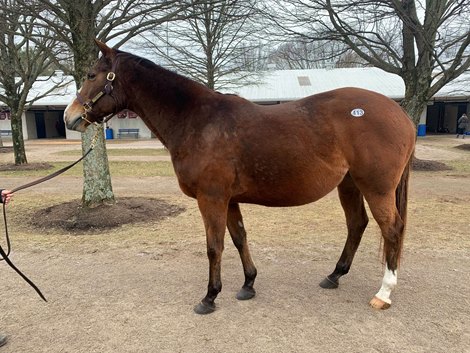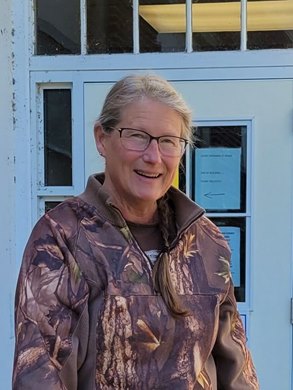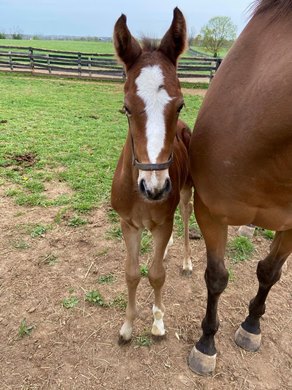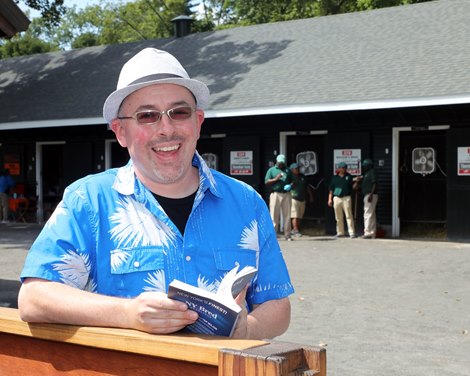You could say that searching for the next superstar racehorse is a lot like finding that under-the-radar auditioner on “American Idol”. At least that’s how Michael Slezak compares the two. Once the nation’s leading expert on television competitions, Slezak is now a grade 1-winning Thoroughbred breeder thanks to Trikari ‘s win in the July 6 Belmont Derby Invitational Stakes (G1T) at Aqueduct Racetrack.
Slezak developed his love for horses while visiting Saratoga Race Course with his dad as a kid, seeing greats such as Unbridled’s Song, Personal Ensign, and Winning Colors. His interest in pedigrees has led to success in claiming or purchasing half sisters of horses on the verge of breakout success. Horses he claimed before the success of their sibling include half sisters to Kentucky Derby (G1) winner Rich Strike , dual grade 1 winner Cave Rock , and millionaire Webslinger .
Slezak’s faith in a graded stakes-winning mare that had yet to produce a winner led to a $14,000 purchase with his longtime friend and partner Amy Boll. The result was his first grade 1 win.
BloodHorse spoke with Slezak about Trikari, his love for Saratoga, his career as an entertainment writer, and how that occupation has helped shape his Thoroughbred breeding aspirations.
BloodHorse: What was it like watching Trikari win that race?
Michael Slezak: I’m not usually at a loss for words. It was unbelievable. I was on the phone with Amy Boll and she couldn’t get the channel on her cable. She said, “Call the race for me.” I said, “I’ll let you listen to the race call and I’ll try to keep it quiet.” I failed miserably in that goal. When he started to make a move on the leader, my radio silence went out the window and I started screaming my head off. I get excited when I’m watching a horse that I bred and it’s winning a $5k claimer, so a grade 1 race—I lost my mind. I felt like Carl Nafzger calling the (1990 Kentucky Derby) for Frances Genter. It was pretty exciting. It’s like a dream come true times 10. Not only did he win a grade 1, but he won it at a New York track which is my home turf.
Trikari wins the Belmont Derby Invitational Stakes at Aqueduct Racetrack
BH: Where in New York are you from?
MS: I’m not far from Saratoga, a small town called Amsterdam. I became a racing fan by going to the track with my dad as a kid. It took one trip to Saratoga to make me a lifelong racing fan. People ask, “How do we grow the sport?” Just take kids to Saratoga. Take them to the paddock, let them look at some horses up close. That’ll do it.
BH: Saratoga just opened this past week, what’s one of your greatest memories of going there?
MS: One memory that stands out, I got to see Unbridled’s Song make his debut (in 1995). There was so much buzz about that horse and this was the 2-year-old to watch. It was a year before my dad passed away. He was not well, but he still loved to go to the track. We went and we watched him make his debut (an 8 1/2-length runaway). It was extraordinary, like time stopped.
BH: How did you get involved as an entertainment writer, and what did your career look like?
MS: As a teenager and a college student, I always knew I wanted to be a writer. I always had a thing for entertainment journalism. I got lucky being able to pursue that dream for decades and became the nation’s leading expert on “American Idol” and “The Voice”. That was my claim to fame.
I was at Entertainment Weekly when Idol started to become a phenomenon and became the person who recapped it. That was a time when people were so into Idol that watching the show wasn’t enough. They had to go online and read about it the next morning. When I started doing it, it was the morning after. As the years went by, the speed and immediateness became you have to have something up within an hour of the show. It’s a lot, but it was fun. And I had a YouTube show where I would interview the contestants as they got voted off and recap the show. It was crazy stuff, but it was fun.
BH: When did you decide to transition from entertainment to breeding Thoroughbreds?
MS: When Idol kind of came to an end during the FOX iteration, my kids were entering kindergarten. It’s a fun job, but when you’ve got to stay up until two or three in the morning to get a recap up, it’s tough to do that and get up in the morning, get your kids off to school, and be present and available. It felt like that was the time to make a career shift. I’d been dabbling in the horse business for a few years at that point, and decided to try and make a full-time go of it.
BH: How did you get started once making the move to breeding?
MS: I started by claiming broodmare prospects, either buying them or claiming them and flipping them. I’ve always been a student of pedigrees since the time I was maybe nine or 10 years old. Getting a copy of the BloodHorse Stallion Register was like the Holy Grail. I remember being a pre-teen, and my mom had done mortgages for a guy who owned a small farm. He passed on the BloodHorse Stallion Register to her, and she’s like, “I brought this home, I thought you might find it interesting.” It was the greatest thing I’d ever seen, just a mind-blowing experience. From that point on, it was endlessly fascinating to me. I can look at a horse’s pedigree any time of day or night. That’s always going to be fun.
I had a few scores with claiming mares and selling them. Suddenly, you’re at a sale selling the mares you claim and realize I could buy one here, too. That’s the hard part with this business, you always want another horse. Once in a while, you can’t talk yourself out of it. That’s how we ended up with Trikari.
BH: What was it that you saw in Dynamic Holiday (Trikari’s dam) that made you say I want her?
MS: She was an incredible race mare with an incredible pedigree. She’s one of seven stakes horses out of her dam. There was just something about her, she exuded class. The knock on her was she had not produced a single winner. That’s why we picked her up for $14,000 pregnant (with Trikari) to Oscar Performance . Shopping in that price range, I can forgive that. Her first two foals were unraced. Her third foal was second in her debut and never ran again.

Dynamic Holiday, carrying Trikari, at the 2021 Fasig Tipton Winter Mixed Sale
The same year, Amy and I bought a mare named I Dazzle. She was in foal to Catalina Cruiser. We sold the filly for $100,000 as a weanling. That was a huge score for us. Funny enough, the day before Trikari won, that filly (Island Fox ) broke her maiden at Aqueduct. That was a weekend of enormous excitement. That may be the pinnacle of my work as a breeder. If that’s as good as it gets, that was a pretty high high.
BH: Tell me more about your partnership with Amy Boll.
MS: She’s one of the first people who really said let’s do this, I believe in your ideas, and I’m willing to put my money behind that. The 2021 babies were the first where we shifted our formula to buy mares in foal to Kentucky stallions as a partnership together and see what we could do.

Amy Boll, co-breeder of Belmont Derby winner Trikari
To have Island Fox and Trikari be the result of that is pretty phenomenal. I learned a lot from her about the physical side of things. When I started this, that was my blind spot and it’s something you have to learn. She’s been great at mentoring me in that area. Having somebody who partners with you and takes a shot with you. She’s a very positive, enthusiastic person and she understands the highs and lows of the business. To have someone who will stay steadfast with you has been pretty great.
BH: What was Trikari like when he was younger, and what happened when you went to sell him?
MS: Amy and I decided to foal that baby out in Kentucky. We usually buy the mares, send them up to New York, foal out a New York-bred, then breed back to a New York stallion. I was always a big fan of Kitten’s Joy as a sire, so I was bullish on Oscar Performance. But I was also realistic in knowing it was a second-year turf stallion.

Trikari as a foal
She foaled out at Nuckols Farm. He was a nice baby. Everybody that saw him liked him, but it’s tough with a second-year turf stallion. He wasn’t going to be a commercial home run. I didn’t think Oscar Performance was going to come out quite as hot with the early 2-year-olds, so we sold Trikari as a short yearling at the (Keeneland) January sale and he brought $9,000. I thought he’d bring a little more than that, but he didn’t. When you combine it with the Catalina Cruiser filly, we bought the two horses for $27,000 total and we sold the two babies for $109,000 total, so that was a success story.
BH: What has it been like watching him grow from a $9,000 short yearling to a near millionaire?
MS: We all want to breed a sales topper, but it’s even more gratifying to see him succeed as a racehorse. I think this is a business where you can do everything right and still end up with a horse that doesn’t make it to the track or break their maiden. To see him having this level of success makes me feel like I might know what I’m doing. Sometimes you need those wins, whether it’s a maiden or a grade 1, those are the moments that give you belief in your ideas and in the path that you’re on.
BH: Is there anything that you learned in the entertainment business that has translated to the Thoroughbred business?
MS: Staying up late and recapping Idol, I can work into the late hours and I scan through the claiming ranks every night. I look at every claiming race in North America for fillies and mares every day. It’s a ridiculous process, but I get a lot of joy and excitement from it. I’m looking for fillies that might have that half sibling who’s percolating, but not quite there yet.
I guess if there’s a similarity, you’re always looking for that auditioner who is flying under the radar and is on the brink of a breakout performance. When you’re recapping those shows, one of your jobs is to try and pick up on those trends. Who’s going to emerge as the dark horse this season? I think there’s a little bit of that in what I do in the Thoroughbred business, looking out for that undervalued horse or that horse that might slip through the cracks. That’s my happy place, finding that horse that maybe is getting overlooked today but might increase exponentially in value tomorrow.



)






